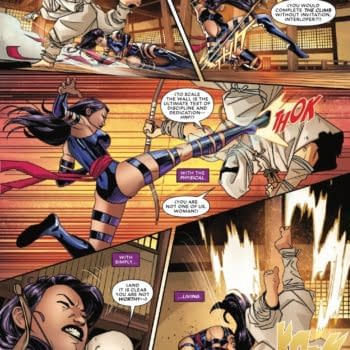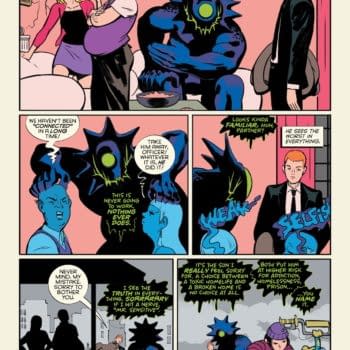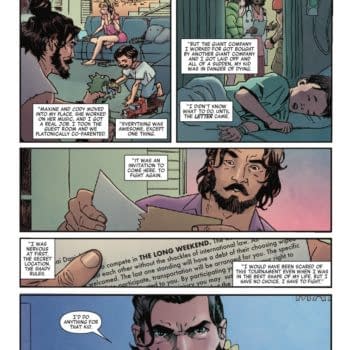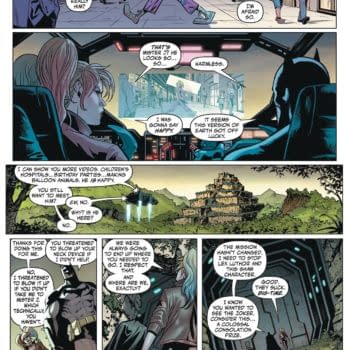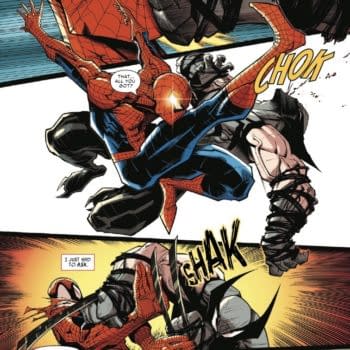Posted in: Comics | Tagged: Comics, david liss, dynamite, entertainment, green hornet, Kewber Baal
5 Reasons Why David Liss Loves Writing Pulp Comics Like The Green Hornet
This week sees the release of the Green Hornet: Reign of the Demon trade from David Liss and Kewber Baal with cover by Ken Lashley. In the series, Britt Reid, the masked crimefighter known as the Green Hornet, and his inseparable ally Kato return. But, if imitation is the sincerest form of flattery, it could be the deadliest for Central City's staunch defenders. The Green Hornet's personal vendetta against organized crime creates a void in Chicago, one filled by two more masked individuals: the vicious Demone and the cavalier Swashbuckler. While the former establishes himself as a most formidable foe, the latter claims to be a friend… but is he playing a far more subtle game?
Herein, Liss talks about the Green Hornet and his own love of writing the pulps.
David Liss:
When I began discussions with Dynamite about doing a Green Hornet story, there were lots of details to work out. Did we want to set it in the past or the contemporary continuity? What kind of antagonist did we want the characters to face? Number one on my wish list was to make the story a continuation of Mark Waid's terrific run, and Dynamite was happy with the idea, but they made one suggestion. They wanted the Hornet to confront a costumed villain.
I loved the idea for a number of reasons, but probably chief among these was that it was a little unusual for a character who usually squares off against mobsters, organized crime bosses, and enemy secret agents. There's nothing like mixing things up and adding new elements to make a story about classic characters even more fun.
Once I started outlining, I wanted to make sure I didn't find myself going off track, though. Don't get me wrong. I love reading and writing superhero comics, but I wanted to avoid accidentally turning my Green Hornet arc into a superhero story. Pulp characters have their own challenges and limitations, and one of my goals was that no matter how outlandish it might become – and I definitely allowed things to get weird – the story should feel pulpy.
As a genre, pulp heroes come in all kinds of flavors, and there are plenty of people who might be willing to say I'm getting it all wrong or missing the key elements, but my intention was to hit the notes that cause pulp to send me to my happy place. Whatever other elements may apply, for me it boils down to the role of these characters in their world.
Why do I love writing pulp characters? Here are at least five reasons:
1. Pulp characters don't belong in their world. Superhero continuities are fun, and I love extended universes full of details and secrets and slowly-evolving revelations. That said, no matter how isolated the teen superhero or persecuted the mutant, when you have a superhero continuity, those persecuted and isolated characters belong somewhere. The world is one in which superheroes exist, and consequently, they belong there. On the other hand, you can have pulp team-ups and crossovers, but you never really get away from the sense that these heroes are outliers, people who don't play by the world's rules and are never going to fit in. The Green Hornet may be the most isolated of all pulp heroes because he can't even allow the world to acknowledge him as a hero. By pretending to be a villain, he denies himself the secret pleasure of knowing that people appreciate his work. In this story, I wanted to drive home that sense of isolation by adding a new costumed hero, a character who basks in public adulation, and who makes the Hornet's carefully crafted double fake-out all the more painful.
2. Pulp characters are vulnerable. Because these characters don't have a place in the world they are risking everything to save, they play high stakes games in which exposure would spell disaster. I am a real believer in the power of the secret identity, and stories get a lot of mileage by threatening a pulp hero's most important secret, but that vulnerability extends to other parts of their lives. In Reign of the Demon, I put a lot of pressure on the emotional vulnerability that comes with Britt Reid's complicated double life and the toll it takes on his closest confidants, Kato and Casey. Those bonds are tested by the pressure of having to make life-and-death choices while covering their tracks and maintaining the illusion of villainy.
3. Pulp characters are isolated. Even though the Hornet has a worthy partner in Kato, he still inevitably feels alone, particularly when it comes to the kinds of hard decisions he has to make. There are several key points in Reign of the Demon in which the Hornet is working with his partners but still feels utterly alone in the choices he makes. Sometimes it's because he and Kato have different priorities, and sometimes it's because the Hornet has a hard time getting out of his own headspace. To me this is the soul of the pulp hero, a character who feels like the world is on his or her shoulders. Relinquishing responsibility, even in the form of taking advice, and feel like abandoning key responsibilities.
4. Pulp characters feel their relationships deeply. Because these characters are isolated, the relationships they do have become all the more important. Of course that applies to a partner like Kato and a major ally like Casey, but this isolation makes the role of supporting characters all the more significant. Reid feels the rivalry with the Swashbuckler and the antagonism of Demone so strongly because these characters are part of the universe he inhabits. No matter how different their goals or their methods, there's a kind of mirroring that happens that always ups the intensity.
5. Pulp characters live in the world they are trying to save. Superheroes often live alongside ordinary people, but their powers or abilities separate them. Pulp heroes, on the other hand, inhabit the world they work so hard to protect. Even supremely wealthy characters like Britt Reid still interact with ordinary people and experience their suffering and fears in a visceral way. In other words, these characters tend to wear their hearts on their sleeves, and every failure is felt all the more keenly. The trick with any characters who set themselves apart from ordinary people is to make sure they seem human and vulnerable. Part of the pleasure of writing pulp characters is that they never lose touch with what makes characters interesting in the first place.










